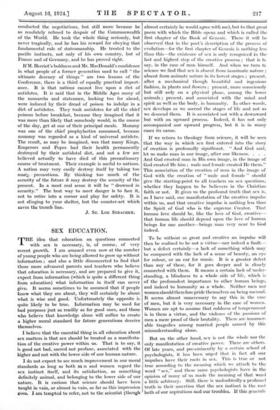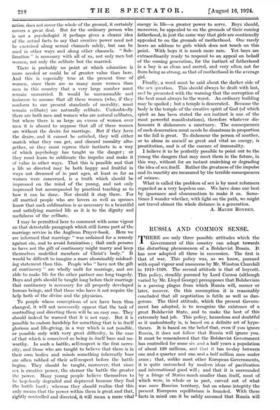SEX EDUCATION.
T'
4 idea that education on questions connected with sex is necessary, is, of course, of very recent growth. I am amazed even now at the number of young people who are being allowed to grow up without information ; and also a little disconcerted to find that those more advanced parents and teachers who believe that education is necessary, and are prepared to give it, expect from information (which is quite a different thing from education) what information in itself can never give. It seems sometimes to be assumed that if people know what they are about, they will certainly be about what is wise and good. Unfortunately the opposite is quite likely to be true. Information may be used for bad purposes just as readily as for good ones, and those who believe that knowledge alone will suffice to create a higher moral standard for future generations deceive themselves.
I believe that the essential thing in all education about sex matters is that sex should be treated as a manifesta- tion of the creative power within us. That is to say, it is good not bad, sacred not profane, associated with the higher and not with the lower side of our human nature. I do not expect to see much improvement in our moral standards as long as both mat and women regard the sex instinct itself, and its satisfaction, as something definitely animal, and belonging to the lower side of our nature. It is curious that science should have been taught in vain, or almost in vain, as far as this impression goes. I am tempted to refer, not to the scientist (though almost certainly he would agree with me), but to that great poem with which the Bible opens and which is called the first chapter of the Book of Genesis-. There it will be observed that in the poet's description of the process of evolution—for the first chapter of Genesis is nothing less than this—the existence of sex is only recognised in the last and highest step of the creative process ; that is tc say, in the case of man himself. And when we turn tc science we find that sex is absent from inanimate nature ; absent from animate nature in its lowest stages ; present, after a mechanical though beautiful and ingenious fashion, in plants and flowers ; present, more consciously but still only on a physical plane, among the lower animals ; present, and associated with the mind and spirit as well as the body, in humanity. In other words, sex develops as we ascend the stages of life and not as we descend them. It is associated not with a downward but with an upward process. Indeed, it has not only accompanied our upward progress, but it is in many cases its cause.
If we return to theology from science, it will be seen that the way in which sex first entered into the story of creation is profoundly significant. "And God said, let us make man in our image, after our likeness. . . . And God created man in His own image, in the image of God created He him ; male and female created He them." This association of the creation of man in the image of God with the creation of "male and female" should give the starting-point to all teachers on sex questions, whether they happen to be believers in the Christian faith or not. It gives us the profound truth that sex is, as I have said, one manifestation of the creative impulse within us, and that creative impulse is nothing less than the Spirit of God who is the supreme Creator. That human love should be, like the love of God, creative— that human life should depend upon the love of human beings for one another—brings man very near to God indeed.
To be without so great and creative an impulse will then be realized to be not a virtue—nor indeed a fault— but a defect certainly—a lack of something which may be compared with the lack of a sense of beauty, an eye for colour, or an ear for music. It is a greater defect than any of these, for it goes deeper and is closely connected with them. It means a certain lack of under- standing, a blindness to a whole side of life, which is of the profoundest importance to other human beings, and indeed to humanity as a whole. Neither men nor women should therefore pride themselves on being asexual. It seems almost unnecessary to say this in the case of men, but it is very necessary in the case of women. Women are apt to assume that coldness of temperament is in them a virtue, and the violence of the passions of men a mere proof of their brutality. There are innumer- able tragedies among married people caused by this misunderstanding alone.
But on the other hand, sex is not the whole nor the only manifestation of creative power. There are others. Of late years, and pre-eminently by a certain school of psychologists, it has been urged that in fact all our impulses have their roots in sex. This is true or not true according to the meaning which we attach to the word "sex," and these same psychologists have in the opinion of many of us made the meaning of that word a little arbitrary. Still, there is undoubtedly a profound truth in their assertion that the sex instinct is the root both of our aspirations and our troubles. If this generah- ration does not cover the whole of the ground, it certainly covers a great deal. But for the ordinary person who is not a psychologist it perhaps gives a clearer idea of the actual facts to say that creative power need not be exercised along sexual channels solely, but can be used in other ways and along other channels. " Sub- limation " is necessary with all of us, not only men but women, not only the celibate but the married.
There is probably no point at which education is more needed or could be of greater value than here. And this is especially true at the present time of women, since there are so many more women than men in this country that a very large number must remain unmarried. It would be unreasonable and insincere to assume that all these women (who, if they conform to our present standards of morality, must remain celibate) are naturally celibate. Undoubtedly there are both men and women who are natural celibates, but where there is so large an excess of women over men it is absurd to suppose that all of these women are without the desire for marriage. But if they have the desire, and it cannot be satisfied, they will either snatch what they can get, and discard morality alto- gether, or they must repress their instincts in a way of which psychology has taught us the danger ; or they must learn to sublimate the impulse and make it of value in other ways. That this is possible and that a life so directed may be both happy and fruitful in ways not dreamed of in past ages, at least so far as women were concerned, is a truth which should be impressed on the mind of the young, and not only impressed but accompanied by practical teaching as to how it can be done. Nor should it stop there. For all married people who are lovers as well as spouses know that such sublimation is as necessary to a beautiful and satisfying married life as it is to the dignity and usefulness of the celibate.
I may be permitted here to comment with some vigour on that detestable paragraph which still forms part of the marriage service in the Anglican Prayer-book. Here we are informed that marriage "was ordained for a remedy against sin, and to avoid fornication ; that such persons as have not the gift of continency might marry and keep themselves undefiled members of Christ's body." It would be difficult to imagine a more abominably mislead- ing statement than this. People who "have not the gift of continency" are wholly unfit for marriage, and are able to make life for the other partner one long tragedy. Boys and girls should be taught long before their marriage that continency is necessary for all properly developed human beings, and that those who have it not require the help both of the divine and the physician.
• To people whose conceptions of sex have been thus changed, it will not necessarily appear that the task of controlling and directing them will be an easy one. They should indeed be warned that it is not easy. But it is possible to endure hardship for something that is in itself glorious and life-giving, in a way which is not possible, or possible only with very great difficulty, in the case of that which is conceived as being in itself base and un- worthy. In such a battle, self-respect is the first neces- sity, and those who are taught to believe that there is in their own bodies and minds something inherently base are often robbed • of their self-respect before the battle begins. They should be taught, moreover, that since sex is creative power, the sterner the battle the greater the power. Many young people believe themselves to be hopelessly degraded and depraved because they find the battle hard ; whereas they should realize that this only means that the power within them is great and that, rightly controlled and directed, it will mean a more vital energy in life—a greater power to serve. Boys should, moreover, be appealed to on the grounds of their coming fatherhood, in just the same way that girls are continually appealed to on the grounds of motherhood. One rarely hears an address to girls which does not touch on this point. With boys it is much more rare. Yet boys are extraordinarily ready to respond to an appeal on behalf of the coming generation, for the instinct of fatherhood in a boy is as clean and sacred, and very often not far from being as strong, as that of motherhood in the average girl.
Finally, a word must be said about the darker side of the sex question. This should always be dealt with last, and be presented with the warning that the corruption of the best must always be the worst. An ordinary building may be spoiled ; but a temple is desecrated. Because the body is the temple of the creative spirit of God (of which spirit as has been stated the sex instinct is one of the most powerful manifestations), therefore whatever dis- honours it dishonours a sanctuary. The consequences of such desecration must needs be disastrous in proportion as the fall is great. To dishonour the person of another, or to abuse in oneself so great and vital an energy, is prostitution, and is of the essence of immorality.
I believe it to be perfectly possible to point out to the young the dangers that may meet them in the future, in this way, without for an instant smirching or degrading the idea of sex itself. Rather the greatness of the impulse and its sanctity are measured by the terrible consequences of misuse.
What is called the problem of sex is by most reformers regarded as a very hopeless one. We have done our best by ignorance and obscurantism to make it so.. Some- times I wonder whether, with light on the path, we might not travel almost the whole distance in a generation.
A. MAUDE ROYDEN.



































 Previous page
Previous page